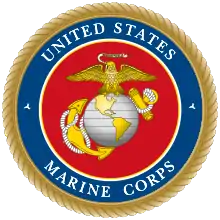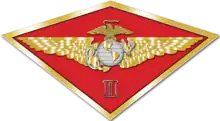HMH-461
Marine Heavy Helicopter Squadron 461 (HMH-461) is a United States Marine Corps helicopter squadron consisting of CH-53E Super Stallion transport helicopters. The squadron, known as "Ironhorse", is based at Marine Corps Air Station New River, North Carolina and falls under the command of Marine Aircraft Group 29 (MAG-29) and the 2nd Marine Aircraft Wing (2nd MAW). With its lineage starting in 1944, HMH-461 is the oldest active Heavy Lift Helicopter Squadron in the Marine Corps.
| Marine Heavy Helicopter Squadron 461 | |
|---|---|
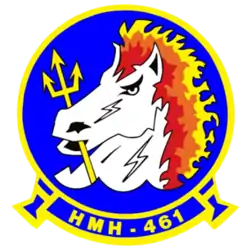 HMH-461 Unit insignia | |
| Active | March 15, 1944 - September 1950 January 1957 - present |
| Country | |
| Branch | |
| Type | Marine Heavy Helicopter Squadron |
| Role | Assault support |
| Part of | Marine Aircraft Group 29 2nd Marine Aircraft Wing |
| Garrison/HQ | Marine Corps Air Station New River |
| Nickname(s) | "Ironhorse" "Red Raider" (World War II) |
| Motto(s) | "Mission First, People Always." |
| Tail code | CJ |
| Engagements | Persian Gulf War Operation Enduring Freedom |
| Commanders | |
| Commanding Officer | LtCol Ryan A. Lynch |
| Executive Officer | Maj Adam A. Horne |
| Sergeant Major | SgtMaj Francisco W. Ortega |
| Aircraft flown | |
| Fighter | F4U Corsair (1944-50) |
| Cargo helicopter | CH-37C Mojave (1957-66) CH-53A/D Sea Stallion (1966-88) CH-53E Super Stallion (1988-present) |
Mission
Support the MAGTF Commander by providing assault support transport of heavy equipment, combat troops, and supplies, day or night under all weather conditions during expeditionary, joint, or combined operations.
History
Early years
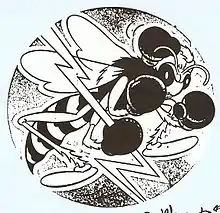
Marine Fighting Squadron 461 (VMF-461) was founded on March 15, 1944 as part of Marine Base Defense Group 43. It was commissioned at Marine Corps Air Station El Centro, California, and flew the Vought F4U Corsair. The callsign of VMF-461 was the "Red Raider" and their patch depicted a red bearded Viking who was their mascot. In January 1945, the squadron was relocated at Marine Corps Air Station El Toro and assigned to Marine Aircraft Group 46 (MAG 46). During 1946 to 1949, VMF-461 was deployed aboard USS Palau, first as part of Marine Aircraft Carrier Group 12, and later, as part of the Atlantic Fleet. Upon return from deployment, VMF-461 was assigned to Marine Aircraft Group 11 at Marine Corps Air Station Cherry Point, North Carolina. In September 1950, VMF-461 was deactivated.
On January 1957, the squadron was reactivated at Marine Corps Air Station New River, North Carolina as Marine Helicopter Transport Squadron (Medium) 461, HMR(M)-461, assigned to Marine Aircraft Group 26. The squadron was equipped as the initial squadron with the HR2S-1 (later to be designated as the CH-37), then the newest and largest helicopter in the Marine Corps inventory. The "Deuce," as it was called, was capable of carrying 26 troops, or 8,000 pounds of cargo at speeds up to 110 knots. The aircraft was powered by two R2800-54 engines and carried a crew of four. As part of the U.S. Space Program in 1961, HMR(M)-461 participated as the primary recovery vehicle for NASA AeroBee Rocket launches at Wallops Island, Virginia In February 1962, HMR(M)-461 was redesignated Marine Heavy Helicopter Squadron-461 (HMH-461).
While deployed aboard USS Boxer and USS Guadalcanal from 1962 to 1965, HMH-461 participated in various deployments and exercises in the Mediterranean Sea and Caribbean Sea. In February 1966, the squadron was reduced to cadre status to await arrival of the CH-53A helicopter, which replaced the CH-37. In November 1970, the CH-53A was replaced by the CH-53D helicopter. Throughout the 1970s, HMH-461 continued its support of Fleet Marine operations in such places as the Mediterranean and Caribbean Seas, Scandinavia, Northern Europe and Great Britain.
New CH-53E Super Stallion helicopters marked another chapter in HMH-461 history with the first operational flight in October 1987. In September 1988, HMH-461 took delivery of its first lot of eleven CH-53Es from Sikorsky Aircraft and would go on to make history as the first Marine Corps aviation unit to aerial refuel using night vision goggles, perform Hover In-flight Refueling (HIFR) over a naval vessel, externally lift a Riverine Assault Craft, load a CH-53E into a C-17 Globemaster, and lift two HMMWVs simultaneously..
The 1990s
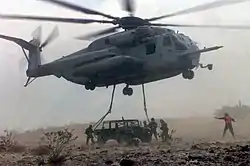
In February 1990, HMH-461 deployed four aircraft aboard ship to support the presidential visit to the Anti-Drug Summit in Colombia.
Beginning in August 1990 through April 1991, the squadron deployed aboard USS Iwo Jima and headed to the conflict in the Persian Gulf. On 5 January 1991, Detachment Delta was retasked from DESERT STORM to support the non-combatant evacuation (NEO) of American citizens from war-torn Mogadishu, Somalia. The IRONHORSES flew almost 500-miles from the sea to successfully begin the NEO of American citizens and open Operation EASTERN EXIT.
Ironhorse Marines again deployed in October 1993 through June 1994 when a detachment of four aircraft left with HMM-362 for contingency operations in Haiti.
They deployed again in May and June 1997 when a detachment from this squadron participated in Operation Guardian Retrieval in Congo-Brazzaville. The detachment then conducted a non-combatant evacuation (NEO) in Sierra Leone as part of VMM-261(Rein) which was named Operation Noble Obelisk. The NEO saved U.S., British, and other third-country nationals who were threatened by the Revolutionary United Front.
21st century
Following the attacks on 11 September 2001, HMH-461 was the first Marine Corps helicopter unit deployed to Djibouti, Africa, in support of Combined Joint Task Force - Horn of Africa. The deployment conducted multiple operations in support of special operations during the Global War on Terror. In June, while on a routine training mission (7) 1000 lbs bombs were dropped on two CH-53Es standing Casevac on the Godoria Range by an Air Force B-52. Captain Seth Michaud was killed in the mishap and both aircraft were destroyed. In October 2003, HMH-461 retrograded home to MCAS New River but would return again with detachments in 2004, 2005, 2006, 2007, 2008, 2009, 2010, and 2012.

At the same time that the squadron main body was deployed to the Horn of Africa, HMH-461's Marines supporting the 22 MEU also encountered difficult flying in the treacherous mountains of Afghanistan. The 22 MEU ACE was stationed at the Kandahar airport in support of Operation Enduring Freedom and designated as part of Task Force Linebacker. The CH-53E proved invaluable in the challenging environmental conditions of Afghanistan. Throughout the spring and summer, the detachment helped efforts to battle Taliban forces, register 58,000 Afghan voters, and treat 2,000 medical and dental patients. After their successful 7 month deployment, the Ironhorses attached to HMM-266 returned to MCAS New River on 16 September 2004.
On August 29, 2005, HMH-461 received the order to deploy with 18 hours notice in support of relief operations for Hurricane Katrina. HMH-461 became the parent squadron and formed HMH-461(-)(REIN) with Marines and equipment from HMH-464, VMM-365, HMT-302 and VMM 264 to support the Special Marine Air-Ground Task Force for the disaster area. HMH-461 self-deployed to NAS Pensacola and started relief operations the next day in New Orleans and Mississippi. Their operations would continue for a month and would also serve to relieve the effects felt after Hurricane Rita made landfall.
_HMH-461.jpg.webp)
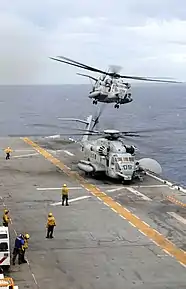
Shortly after returning home, the squadron received a warning to embark HMH-461 to go to Mar Del Plata, Argentina to support the President of the United States in support of the 4th Summit of the Americas. Two and a half weeks were spent in Argentina before returning to United States.
While simultaneously deploying detachments to the Horn of Africa in 2005 and 2006, the squadron's detachment to HMM-261 in support of the 22 MEU, deployed from the Persian Gulf more than 456 miles inland to conduct operations supporting 2d MAW in Al Asad, Iraq. They supported OIF 04 -06 through daily operations within the Multi-National Forces-West Area of Operations. Following their operations in Iraq, the detachment then supported Operation Image Nautilus 2006 in Djibouti, Africa.
The next HMH-461 MEU detachment, attached to VMM-365 in August 2007 and would deploy to Kandahar, Afghanistan in March 2008. The Marines of HMH-461 Det A continued to support the assault support and heavy lift requirements of the 24th MEU operating in the volatile Helmand Province of Afghanistan until they all returned home safely in November 2008.
Notice came again to deploy in June 2009 with five days warning in order to support Operation Jupiter Sentinel. The squadron rapidly embarked 4 aircraft and all available Ironhorse Marines aboard the USS Iwo Jima (LHD-7) which quickly started steaming towards the Ghanaian coast to support President Barack Obama's visit to Accra and Cape Coast Castle. In January 2010 the squadron was mobilized at short notice and transported the 22nd Marine Expeditionary Unit to aid relief efforts in Haiti after the recent devastating earthquake (Operation Unified Response).[1] At the same time, the squadron's MEU detachment deployed early via strategic lift to support disaster relief operations in Pakistan following historic flooding.
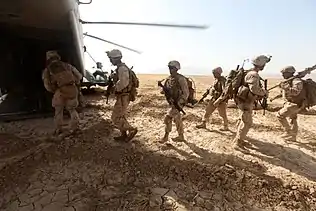
In January 2011, HMH-461, joined by a detachment from HMH-465, deployed to Camp Bastion, Afghanistan in support of Operation ENDURING FREEDOM 11.1. During the deployment, Ironhorse moved more than 7.7 million pounds of cargo, carried over 35,000 passengers, and conducted two Tactical Recovery of Aircraft and Personnel (TRAP) missions retrieving two crashed H-47 aircraft.
The squadron would deploy again to Camp Bastion in 2013, this time as an entire unit, in support of Operation ENDURING FREEDOM 13.1; moving more than 4.3 million pounds of cargo, 23,800 passengers, and completing more than 130 named tactical raids and assaults. For its operational excellence in Afghanistan, HMH-461 was awarded the Keith B. McCutcheon, Marine Heavy Helicopter Squadron of the Year Award in 2012 and 2014.
In May 2015, HMH-4461, like before in the Horn of Africa, would be the lead active duty heavy lift detachment to send regular rotations to Soto Cano Air Base, Honduras as part of SPMAGTF-SC. The rotation would return in May 2018 to support volcano disaster relief and VIP visits including the Vice President of the United States.
HMH-461 Squadron Commanders
| Name | Dates in command | Name | Dates in command | Name | Dates in command | ||
|---|---|---|---|---|---|---|---|
| Griffith B. Doyle | 12 Jan 57 - 16 May 58 | Edward R. Seiffert | 25 Mar 77 - 16 Nov 78 | Scott W. Wadle | 17 Sep 10 - 23 Mar 12 | ||
| William R. Rozier | 17 May 58 - 13 Aug 59 | Warren D. Kalas | 17 Nov 78 - 9 May 80 | Nicholas A. Morris | 23 Mar 12 - 18 Oct 13 | ||
| James A. Etheridge | 14 Aug 59 - 19 May 61 | Peter F. Angle | 10 May 80 - 22 May 81 | Wade J. Dunford | 18 Oct 13–1 May 15 | ||
| George H. Green Jr. | 20 May 61 - 15 Nov 61 | Ernest G. Noll Jr. | 23 May 81 - 24 Nov 82 | Scott T. Trent | 1 May 15–18 Nov 16 | ||
| Eugene J. Pope | 16 Nov 61 - 6 Apr 63 | Henry A. Detering | 25 Nov 82 - 28 Jun 84 | David A. Schreiner | 18 Nov 16 - 1 Jun 18 | ||
| David Riley | 7 Apr 63 - 16 Jun 64 | Terry P. Swanger | 21 Jun 86 - 16 Jan 87 | Brian T. Laurence | 1 Jun 18 - 12 Dec 19 | ||
| Truman Clark | 17 Jun 64 - 12 Jan 65 | Thomas A. Reavis | 17 Jan 87 - 2 Mar 89 | Ryan A. Lynch | 12 Dec 19 - Present | ||
| Royce W. Watson | 13 Jan 65 - 14 Feb 65 | Daniel J. Moseler | 3 Mar 89 - 12 Jun 91 | ||||
| Philip G. Dyer | 15 Feb 65 - 1 Jun 65 | Samuel T. Helland | 13 Jun 91 - 27 May 93 | ||||
| R. L. Hawley | 2 Jun 65 - 1 Jan 66 | Spencer H. Smith | 28 May 93 - 17 Nov 94 | ||||
| Charles H. Northfield | 6 Jan 66 - 3 Jan 67 | Daniel C. Schultz | 18 Nov 94 - 21 Jun 96 | ||||
| Joseph L. Davis | 4 Jan 67 - 5 Jun 68 | John R. Suter | 22 Jan 96 - 8 May 98 | ||||
| James C. Robinson | 6 Jun 68 - 30 Jun 69 | Thomas L. Hanks | 8 May 98 - 12 Apr 00 | ||||
| Carroll G. Redman | 1 Jul 69 - 17 Jan 70 | Mark A. Clark | 13 Apr 00 - 15 Nov 01 | ||||
| Richard E. Skinner | 18 Jan 70 - 7 Dec 70 | Larry Fulwiler | 16 Nov 01 - 2 Jun 03 | ||||
| Donald E. Webb | 8 Dec 70 - 31 Jan 72 | Lawrence E. Miccolis | 3 Jun 03 - 18 Nov 04 | ||||
| Ernest G. Young | 1 Feb 72 - 22 Jun 73 | Robert D. Pridgen | 18 Nov 04 - 19 May 06 | ||||
| Robert D. Fowner | 23 Jun 73 - 14 Nov 74 | Francisco B. Crissafulli | 19 May 06–19 Nov 07 | ||||
| Billy G. Phillips | 15 Nov 74 - 19 May 76 | Paul H. Johnson | 19 Nov 07 - 9 Mar 09 | ||||
| Hubert M. Bartell | 20 May 76 - 24 Mar 77 | Sean M. Salene | 9 Mar 09 - 17 Sep 10 |
Unit awards
A unit citation or commendation is an award bestowed upon an organization for the action cited. Members of the unit who participated in said actions are allowed to wear on their uniforms the awarded unit citation. HMH-461 has been presented with the following awards:
| Streamer | Award | Year(s) | Additional Info |
|---|---|---|---|
| Navy Unit Commendation Streamer with one Bronze Star | |||
| Meritorious Unit Commendation Streamer | |||
| World War II Victory Streamer | 1941–1945 | Pacific War | |
| National Defense Service Streamer with three Bronze Stars | 1950–1954, 1961–1974, 1990–1995, 2001–present | Korean War, Vietnam War, Gulf War, War on Terror | |
| Armed Forces Expeditionary Streamer | 1992–1993 | Somalia | |
| Southwest Asia Service Streamer with three Bronze Stars | |||
| Global War on Terrorism Expeditionary Streamer | 2001–present |
Horn of Africa | |
| Global War on Terrorism Service Streamer | 2001–present | ||
| Afghanistan Campaign Streamer with two Bronze Stars | 2011, 2013 | OEF 11.1, OEF 13.1 | |
See also
References
- Notes
 This article incorporates public domain material from websites or documents of the United States Marine Corps.
This article incorporates public domain material from websites or documents of the United States Marine Corps.
- "The Big One: Naval aviation brings relief to earth-ravaged Haiti". Naval Aviation News. 30 August 2010.
- HMH 461 History - US Marines official website
- Bibliography
- Rottman, Gordon L. (2002). U.S. Marine Corps World War II Order of Battle - Ground and Air Units in the Pacific War, 1939 - 1945.’’. Greenwood Press. ISBN 0-313-31906-5.
- Sherrod, Robert (1952). History of Marine Corps Aviation in World War II. Washington, D.C.: Combat Forces Press.
- Vice President Cheney speaks to HMH-461 Marines
